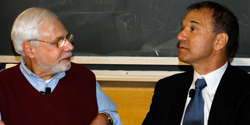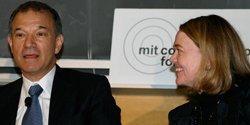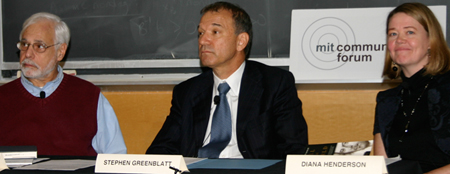| Literature / History / Biography |
||
|
Tuesday, Oct. 14, 2008 Stephen Greenblatt is the Cogan University Professor of the Humanities at Harvard, and the author of several books including, most recently, Will in the World: How Shakespeare Became Shakespeare. He has also served as general editor of the Norton Anthology of English Literature and of the Norton Shakespeare. His recent work includes the play Cardenio, staged this year by the American Repertory Theater. Diana Henderson is Professor of Literature and Dean for Curriculum and Faculty Support at MIT. She is the author of Collaborations with the Past: Reshaping Shakespeare Across Time and Media and Passion Made Public: Elizabethan Lyric, Gender and Performance and the editor of the collections Alternative Shakespeares 3 and A Concise Companion to Shakespeare on Screen. She has served as dramaturg for professional and collegiate theatrical productions. Moderator: David Thorburn is Professor of Literature and director of the Communications Forum at MIT. He is the author of Conrad’s Romanticism, and, most recently, co-editor of Rethinking Media Change: The Aesthetics of Transition. A podcast of Literature / History / Biography is now available. Photos by Greg Peverill-Conti David Thorburn began with an anecdote, joking that he was actually the father of New Historicism because as an assistant professor of English at Yale in 1969 he advised a brilliant graduate student named Stephen Greenblatt to reject a job offer from Yale and accept a position at UC, Berkeley. At that time, the Yale English department was the unrivaled leader in the field. Even at this early point in his career, Greenblatt said he had felt it was important to view scholarly writing as a kind of literature in itself, an idea that was somewhat transgressive in the community at the time. The “New Criticism,” grounded in “close reading” of literary texts, was the dominant ideal among the Yale faculty. This practice minimized historical and sociological approaches to literature, focusing instead on the text itself. Greenblatt expressed some regret that he and others of his generation had grown impatient with these ideas and moved away from them in their work. But Thorburn pointed out that Greenblatt's signature essays were superb examples of close reading, though they often centered on non-literary texts or combined historical perspectives with a keen sense of the aesthetic and the literary. Diana Henderson agreed that Greenblatt's work extended the methods of the New Critics, but noted that these methods had become broader since the 1970s. Greenblatt said his sense of vocation had been enlarged by his time studying at Cambridge University, where he worked with the cultural historian Raymond Williams. He also mentioned a literary exercise popular there in which students were asked (or required on tests) to identify the author of short passages of prose and poetry drawn from all periods of English literature. Greenblatt said he thought these exercises were foolish at the time, but came to realize that they nourished his ability to recognize the historical and sociological markers embedded in all texts. Shifting the discussion to Greenblatt’s influential book, Renaissance Self-Fashioning, Thorburn asked what he meant when he wrote in a preface to a late edition that "This was the book in which I found my voice." Greenblatt replied that he meant he was no longer an apprentice. This was his first project undertaken without a teacher’s guidance. Writing it, he began to discover what he sounded like when he wasn’t worrying about an advisor’s opinions. In Renaissance Self-Fashioning, Greenblatt said, he began to think beyond the model of an individual life, about what lives are in a larger social or anthropological system. The process of selecting which elements of individual lives to include is partly a practical matter; without certain editorial decisions, a scholar would never be able to complete a project because there is always more information to discover about a subject. Greenblatt said he has tried hard to teach himself and his students to be responsible but not obsessive in their research. The perennial issue of human agency has been central in the discourse surrounding New Historicism, Thorburn said, and is a recurring topic in Greenblatt’s work. How constrained by social, historical and ideological forces are individual actions? Greenblatt agreed this was a crucial but also problematic topic for him. To illustrate the complexity of the problem, he described an experience of his own. On a lecturing visit to Israel, he attended a dinner at a residence in the old city. Although raised in a Jewish home, he’d become an atheist early on and was not sympathetic to any form of religious ritual. Yet when, at his hosts urging, he joined in singing a traditional Hebrew prayer to bless their meal, he found himself uncontrollably moved and began to weep. This was a surprising and confusing experience, he said, an unwanted response to feelings and beliefs long repudiated: an example of behavior generated by his history, unwilled, not chosen. But the experience also created an opening for an act of conscious agency, he explained, because he able to decide how to respond to his uncontrollable weeping. There were many possible ways to interpret and act upon his somatic reaction. He chose to meet with members of the PLO a few days later. This mix of voluntary and involuntary action has been a defining preoccupation in everything he’s written. Discussion: QUESTION: Where is the field of literary study headed, and how is progress in it different from progress in other fields? GREENBLATT: It's nothing like physics, where a superior way of understanding things is replacing an inferior way. There's no particular endpoint to literary study. As for what's next, I'm interested in mobility studies. Instead of imagining that cultures and objects are essentially stationary or static, what if we assume that nomads, or exchange, or transformation, or exile is actually the normative state? I've been trying to think of a new set of terms for understanding culture as something in process, defined by movement. A second new direction is the weakening of the boundary between the production of art and criticism. I don't believe that critical work is or could be indistinguishable from what great artists create, but there may be more interesting ways to relate our pedagogical and interpretive practice to the makers. Students want to do this, and with digital technology they are able to make remarkable things. QUESTION: The historical materials we have access to and the way we view them often depend on the way our predecessors interpreted and chose to pass on information. Are there moments in scholarship that irrevocably change the perception of what the world was like before? GREENBLATT: Yes, there are moments after which going back to that world, in the pure sense, is impossible. But the dream of going back remains enormously powerful. To give that dream up and accept that all we have is what the clerks of history have given us depresses me. One of the thrills for me as an academic has been finding texts that I didn't know existed. For example, a few years ago I came across the diary of a student named Richard Maddox who went on an ocean voyage to the new world.Once he was on the ship, he realized that he hated every person he was traveling with; he became paranoid, believing that they were reading his private diary. He began writing in code, and the only reason the diary survived is that no one could figure out what it said after he died. When I read it, I felt a delicious sense that I was hearing a voice that hadn't been mediated in 50,000 ways. Of course that wasn't entirely true, but it was a very different experience from reading, say, Hamlet. QUESTION: What place does imagination have in the process of fully describing a sociological moment? What's the relationship between the hypothetical and the historical in your work and in New Historicism? GREENBLATT: I want to resist the idea that archival material and conjectures about it exist completely separately. It's much more complicated than that because the materials themselves are saturated with the conjectures of the people who created them. I've always thought scholars should find ways to deploy the imagination that they prize in the writers they study, but I accept the rules of the game, which say that you can't make things up. I don't consider anything I've written to be a fiction, but I have tried to incorporate some writerly and imaginitive effects into my work. It was more extreme in my book Will in the World simply because there were so few hard facts to go on. But I still couldn't do what fiction writers have done with Shakespeare, which was to write a narrative about sexual betrayal and jealousy. There has to be at least a tiny hook of documentary evidence on which to expand, and we just don't have it in that case. QUESTION: Some reviewers of Will in the World criticized your treatment of Shakespeare's mother's Catholicism, an area where you take a great imaginitive leap. Would you respond to that? GREENBLATT: There's an ongoing debate about whether Shakespeare was a Catholic or not. I don't think he was a serious practicing Catholic as an adult, but the evidence is difficult to understand and I may have gotten it wrong. Even though I didn't think his work was particularly pious, I saw in it a lifelong grappling with Christianity and specifically with Catholic practices. I couldn't prove anything, but I thought it was interesting to tease out a life lived in the shadow of Catholic belief. Shakespeare loved damaged institutional goods, and he drew upon them for aesthetic purposes all his life. My opinion is that he did this because he had a close personal relationship with them, but whether or not that's true, their presence can felt in all his work. |
||





